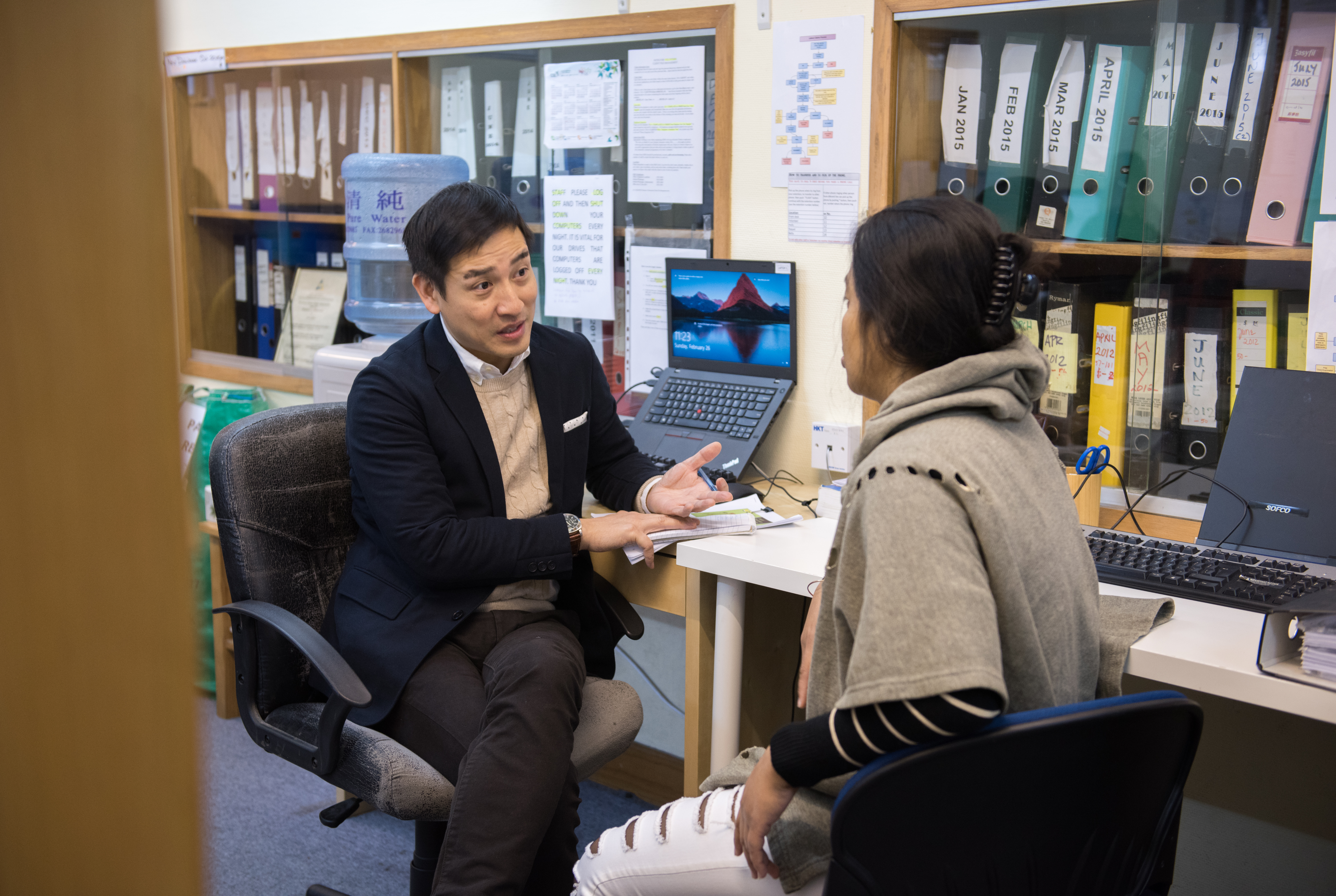We rely on the generosity of people across Hong Kong to help us offer domestic workers help. Without every one of these people offering their time and expertise, we wouldn’t be where we are today.
If you’ve ever wondered what it’s like to volunteer for HELP or the importance of supporting the rights of domestic workers, we spoke to Jason Y. Ng, one of our regular volunteers, to find out just that...and more.
Thanks for taking the time to chat with us Jason.
HELP: Tell us about your first encounter with a domestic worker.
Jason: When I was a child, many of my friends had live-in help at home. I didn't think much of it at the time -- I just thought how nice it must be to have someone who does everything for you: drop you off and pick you up from school, carry your school bag, cook you meals at home, and bring you soda and ice-cream any time you want.
Having spent two decades living abroad, I returned to Hong Kong as an adult 12 years ago. One of the shocking things I remember seeing was the Sunday street scene. Tens of thousands of women would camp out on the streets all over the city. They would share food, play cards, nap, and style each other's hair inside cardboard fortresses built on the sidewalks. My gut reaction was: why don't we try to give these migrant workers a decent place to hang out on Sundays? How can our government bring these workers here and not think of better ways to accommodate them? 12 years later, I'm still asking myself those same questions.
HELP: How did you get involved with HELP?
Jason: I started getting involved with the foreign domestic worker (FDW) community shortly after returning to Hong Kong. As a writer, I try to tell their stories in my books and newspaper columns. I also work with NGOs like the Wimler Foundation and Pathfinders, as well as with the Philippine Consulate General.
Two years ago, my co-workers and I started a pro bono program at my employer (I'm an in-house lawyer at a bank). One of the NGO partners we approached was Helpers for Domestic Helpers -- now Help with Domestic Workers. A few of us began volunteering at HDH's Sunday legal advice clinic at St. John's Cathedral. That's how I got to know amazing HDH folks like Holly Allan and Raquel Amador.
HELP: Why do you feel supporting domestic workers, and HELP, is so important?
Jason: FDWs are one of the most neglected communities in Hong Kong. There is a misguided notion among the Cantonese population that we should help "our own kind" first. Also, government bureaucrats and politicians have little appetite or political will to bat for FDWs because of a rising populist sentiment in Hong Kong.
HELP: From volunteering with HELP what do you think are the most common issues domestic workers in Hong Kong are facing?
Jason: The biggest challenges facing FDWs, on a personal level, are homesickness, separation from family and spousal infidelity. With their employers, they often face verbal and physical abuse and trust issues that sometimes end in dismissal. Because FDWs are not the best money managers, some of them get into problems with loans or fall victim to scammers. What's more, employment agencies both in the home countries and here in Hong Kong prey on the uninformed and overcharge agency fees.
Then there are systemic issues in Hong Kong, ranging from general apathy to subtle racial prejudice and outright discrimination. The law book is also heavily stacked against FDWs. For instance, FDWs must leave the city if they fail to renew their employment contract within 14 days. The law also forbids workers from living away from their employers, even if the latter are abusive. In 2013, the Hong Kong courts denied FDWs the right to become permanent residents even after meeting the seven-year residence requirement.
HELP: What’s one thing you've learnt about yourself/Hong Kong through your work with HELP?
Jason: What struck me the most about the FDW community is the way they manage to stay upbeat and optimistic despite the many challenges facing them. You just have to see the way they smile and enjoy themselves on Sundays. Their inner strength and capacity to forgive and forget are nothing short of inspirational.
HELP: What do you wish the public knew about domestic workers in Hong Kong?
Jason: Quite a few things!
First of all, FDWs are people just like you and me -- they deserve respect and compassion. Too many local employers treat their workers like a household appliance: turn them on when help is needed and turn them off when the task is finished.
Second, every time a case of FDW abuse comes to light and is reported in the news, the public brushes it off as an "isolated incident." But they are not. Verbal and physical abuse is systemic in Hong Kong.
Third, the FDW community has made an immense contribution to our economy by allowing both spouses in the household to enter the workforce. Not many in Hong Kong recognize this fact and show very little interest in improving their work conditions. For instance, because space is scarce in Hong Kong, the live-in domestic workers often bear the brunt of it and some are asked to share a bed or sleep on the kitchen floor. Also, why is it that we can't open up our schools and office spaces on Sundays to let them have a dignified place to spend their day off when schoolyards and conference rooms are left empty?
I believe that most Hong Kongers are good, decent people, and yet somewhere, somehow we lost perspective and the ability to empathize when dealing with people who look and sound different from us.
HELP: What advice do you have for domestic workers who are being mistreated?
Jason: Speak up and seek help. Reach out to support groups like Help for Domestic Workers. Do not suffer in silence or internalize the mistreatment and blame yourselves.
HELP: What’s the best way to start a conversation with someone who doesn't understand some of the issues domestic workers face?
Jason: I'm always keen to speak to people who have live-in help and try to find out how things are getting on at home. Almost everyone I speak to thinks that they are "very nice" to their domestic workers. Nobody ever admits to any mistreatment or wrongdoing.
Thanks to all of our volunteers, past and present. If you want to get involved, we are always looking for people to help us with this important work. Find out more here.

About Jason
Jason Y. Ng is a bestselling author, news columnist, and adjunct associate law professor at the University of Hong Kong. He is a co-founder and President of PEN Hong Kong, one of 145 PEN centers around the world that promote literature and defend the freedom of expression. For years, Ng has been an outspoken advocate for the rights of foreign domestic workers in Hong Kong, writing extensively about the challenges they face and working with support groups including Help for Domestic Workers, the Wimler Foundation and Pathfinders Hong Kong. For more, visit www.jasonyng.com.

